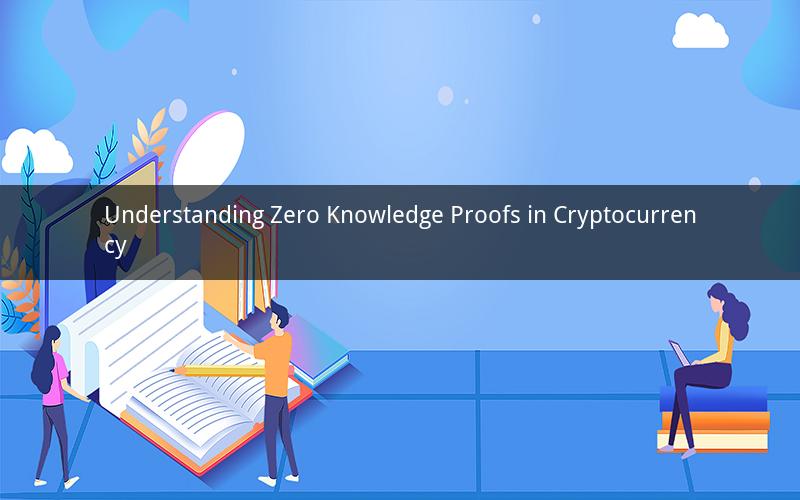
Zero knowledge in cryptocurrency is a groundbreaking concept that has revolutionized the way we perceive security and privacy in digital transactions. It is a cryptographic method that allows one party to prove to another that a statement is true without revealing any information beyond the fact that the statement is indeed true. This article delves into the intricacies of zero knowledge proofs, their significance in the crypto space, and their potential applications.
What is Zero Knowledge Proof?
At its core, a zero knowledge proof is a method of demonstrating the validity of a statement without revealing any information about the statement itself. It operates on the principle that if a statement can be proven without revealing its underlying information, then it is considered zero knowledge. In the context of cryptocurrency, zero knowledge proofs ensure that sensitive information, such as private keys, remains secure and private.
How Zero Knowledge Proofs Work
Zero knowledge proofs work by establishing a protocol between two parties: the prover and the verifier. The prover's goal is to demonstrate the truth of a statement without revealing any additional information, while the verifier's goal is to confirm the truth of the statement without gaining access to the underlying information.
The protocol typically involves the following steps:
1. The prover presents a statement to the verifier.
2. The verifier challenges the prover by asking for additional information.
3. The prover responds to the challenge by providing additional information without revealing the underlying statement.
4. The verifier confirms the truth of the statement based on the information provided by the prover.
Types of Zero Knowledge Proofs
There are several types of zero knowledge proofs, each with its unique characteristics and applications:
1. Non-interactive Zero Knowledge Proofs: These proofs do not require any interaction between the prover and the verifier. The prover generates a proof that the verifier can verify independently.
2. Interactive Zero Knowledge Proofs: These proofs require a series of interactions between the prover and the verifier. The prover presents a statement, and the verifier challenges the prover with questions until the statement is proven true.
3. Zero Knowledge Argument of Knowledge (ZAK): This type of proof allows the prover to demonstrate that they know the solution to a computational problem without revealing the solution itself.
4. Zero Knowledge Range Proof: This proof allows the prover to demonstrate that a number falls within a specific range without revealing the actual value of the number.
Significance of Zero Knowledge Proofs in Cryptocurrency
Zero knowledge proofs have several significant applications in the cryptocurrency space:
1. Privacy: Zero knowledge proofs enable users to transact privately without revealing their identities or transaction details.
2. Scalability: By allowing transactions to be verified without the need for additional information, zero knowledge proofs can help reduce the load on blockchain networks, thereby enhancing scalability.
3. Security: Zero knowledge proofs ensure that sensitive information, such as private keys, remains secure and private, thereby mitigating the risk of theft or fraud.
4. Smart Contracts: Zero knowledge proofs can be used to create more secure and efficient smart contracts, as they allow for conditional execution based on the truth of a statement without revealing any additional information.
Potential Applications of Zero Knowledge Proofs
The potential applications of zero knowledge proofs in the crypto space are vast and varied:
1. Identity Verification: Zero knowledge proofs can be used to verify the identity of individuals without revealing their personal information.
2. Financial Services: Zero knowledge proofs can be used to streamline financial transactions, reduce fraud, and enhance privacy.
3. Supply Chain Management: Zero knowledge proofs can be used to ensure the authenticity and integrity of products in the supply chain.
4. Healthcare: Zero knowledge proofs can be used to protect patient privacy while allowing healthcare providers to access relevant information.
5. Voting Systems: Zero knowledge proofs can be used to ensure the confidentiality and integrity of voting systems, thereby enhancing trust in the electoral process.
Frequently Asked Questions
1. Q: What is the main advantage of using zero knowledge proofs in cryptocurrency?
A: The main advantage is that it provides privacy and security by allowing transactions to be verified without revealing sensitive information.
2. Q: Can zero knowledge proofs be used to prevent double spending in cryptocurrencies?
A: Yes, zero knowledge proofs can be used to prevent double spending by verifying the ownership of a digital asset without revealing the owner's identity.
3. Q: How do zero knowledge proofs impact the scalability of blockchain networks?
A: Zero knowledge proofs can enhance scalability by allowing transactions to be verified without the need for additional information, thereby reducing the load on the network.
4. Q: Are zero knowledge proofs more secure than traditional cryptographic methods?
A: Zero knowledge proofs are considered to be more secure because they ensure that sensitive information remains private and secure.
5. Q: Can zero knowledge proofs be used in other industries besides cryptocurrency?
A: Yes, zero knowledge proofs have the potential to be used in various industries, such as healthcare, financial services, and supply chain management, to enhance privacy and security.